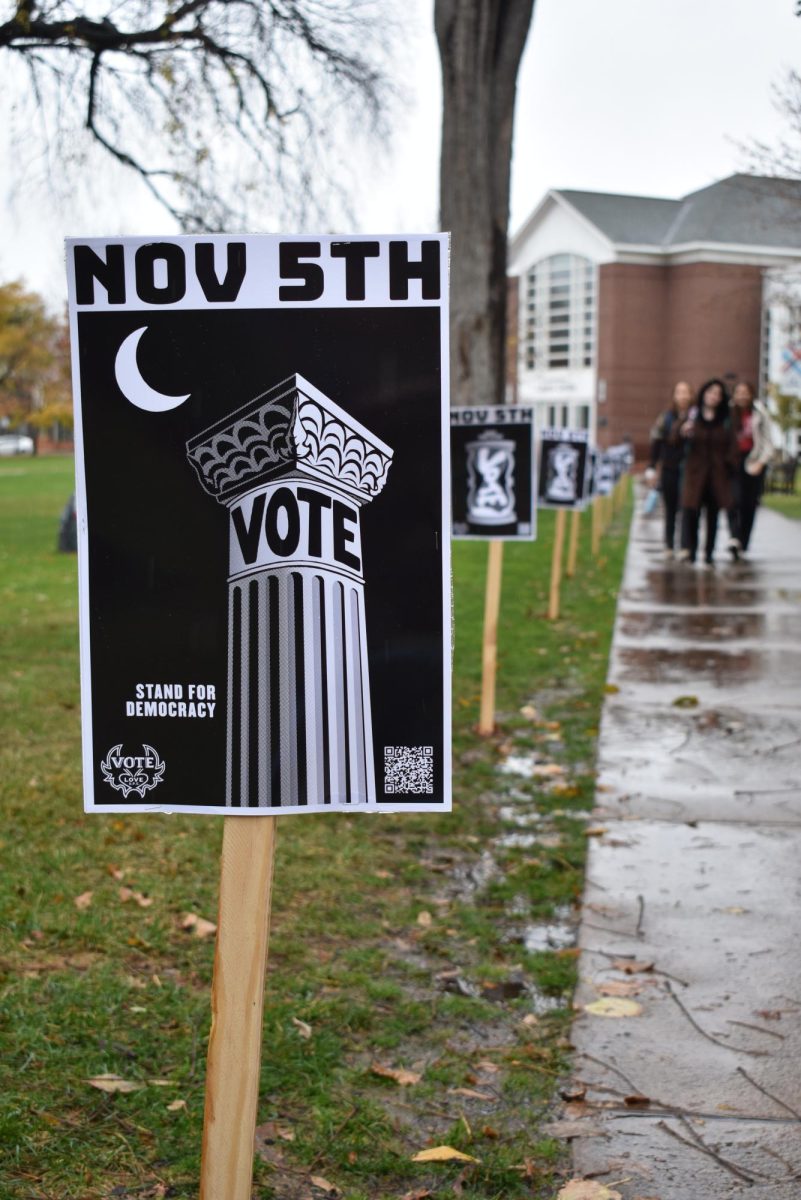Against a backdrop of campus-wide uncertainty and several months’ build-up of anxieties surrounding the contentious race for president between Vice President Kamala Harris and former President Donald Trump, Macalester community members flocked to the polls this past Tuesday, Nov. 5 to cast their ballots in the 2024 general election. The following day, people across the nation woke up to the news that Trump had been declared the winner and is set to become the 47th president of the United States come Inauguration Day on Jan. 20, 2025.
Many students, both those living on and off campus, had carved out time in their schedules to head to their respective polling sites across Ramsey County to vote in races at the federal, state and local levels. At the Macalester Plymouth Church, one designated polling site in the Macalester-Groveland neighborhood, dozens of community members went inside accompanied by friends and family members and walked away feeling hope, apprehension and everything in between.
The Mac Weekly interviewed several individuals who showed up to the polls throughout Election Day morning. In those conversations, Macalester students articulated a wide variety of reasons for being compelled to vote in this year’s election. Many shared that it was their first time voting in a presidential election.
Rachel Scher ’27 was one of those first-time voters, explaining that she began to cultivate an interest in politics following the presidential election in 2016 and has followed politics closely ever since.
“I’ve always been keeping up with political news since I was in middle school,” Scher said. “Especially seeing Trump getting elected in 2016 — that was kind of a wake-up call for a lot of people my age. Since then, I’ve always thought it was important to vote … [and] talk with my parents about who they’re voting for, … even when I wasn’t able to [vote].”
According to Aimée Heard ’28, if you had asked her about voting two years ago, she would not have expressed any interest in casting a ballot. However, from where she stands now, there is deep significance in engaging with elections at the polls.
“Now that I’m eligible to vote, I see the pros of getting to decide who’s in power, because I’ve had some questionable presidents in charge of my life over the past decade or so,” Heard said. “At the same time, I want to also be an active member of my community, and part of what my community does is vote.” For some students, voting in this election also meant making sure that others’ voices were heard.
“The conversations I had with people who urged me to vote [were with] the ones who don’t have that privilege to — they don’t have a say, they don’t have a voice,” Leo Corral ’25 said. “[For us] as people who get the privilege to vote and be born in this country, it’s one of the few things we can do and also costs us nothing.”
In the months leading up to the election, the Community Engagement Center (CEC) organized programming through Mobilize Mac, the CEC’s framework for “democratic engagement and elections-related work via campus-wide collaboration across numerous departments and offices,” according to the college’s website. Throughout this semester, students involved in the CEC’s work have helped with tabling, delivering classroom presentations about voter registration information and connecting with different student groups about participating in the election.
Samantha Schafer ’26, an election engagement assistant at the CEC, shared that she considered her collaboration with the Student Athlete Advisory Committee (SAAC) among the highlights of her work this fall.
“Working with the athletes has been a really lovely experience because it’s not necessarily a group of people you would expect to be wanting to be involved, especially since they’re so busy,” Schafer said. “Being a student athlete is basically a full time job, but Justin [Potts ’25] and the SAAC representatives are just great people and they’ve been incredible at engaging the athletes in voter activity.”
Emma Runchey Smalley ’26, the CEC’s policy and justice issue area organizer, also expressed having enjoyed working with students in her work at the CEC, particularly through the community organizing cohort. That said, Runchey Smalley explained that this election cycle also came with certain challenges.
“I think this semester has just been kind of a difficult one,” Runchey Smalley said. “At the CEC, we’re non-partisan obviously, so we do entirely non-partisan ‘Get Out the Vote’ efforts, which is something that I really enjoy doing. But I think that people have a lot of feelings about the election — a lot of different feelings — and people are coming at it from very different angles and experiences and opinions on things that are happening.
“I think trying to find a balance of ensuring that we are involving as many people as we possibly can, regardless of voter eligibility status, while also respecting that people have many different viewpoints and opinions on the election, that’s been a challenge, but … I’m glad that we’re having the conversations of how to balance all of it.”
In the early morning of Wednesday, Nov. 6, the Associated Press called the race for Trump after it was announced that he had won the state of Wisconsin. Later that afternoon, Harris delivered a concession speech to a crowd of her supporters at Howard University, stating that she had lost the election.
Across campus, there was a widely felt sense of disappointment as students carried on through their classes and day-to-day commitments.
In an interview with The Mac Weekly, Kyra Layman ’25, president of Mac Dems, recalled the growing concerns and fears that she and several other Macalester students and alumni felt as Election Day wore on.
“Because of our work with the [Democratic-Farmer-Labor Party], George Koral [’25] and I … attended the DFL election night party,” Layman wrote. “The energy was pretty good until 10:30 [p.m.] or so, but when Sen. Sherrod Brown lost reelection in Ohio and [The New York Times’] predictions started changing more quickly, that’s when things started going downhill and we had to really fathom a second Trump presidency. By the time Sen. Amy Klobuchar gave her reelection victory speech, at least half the audience was crying or looked uneasy.”
Assistant Director of the CEC Derek Johnson acknowledged that students will have different needs as they continue to navigate difficult feelings in response to the election results — a key consideration in planning post-election programming across campus.
“We’ve been cognizant, moving up to the election, that there is a difference between a more cerebral, academic meaning-making, which is important … versus talking about anxiety, what you want to do about it, or people — depending on results — feeling vulnerable, feeling disheartened,” Johnson said. “The other thing I’ll say is that we recognize that … for a lot of students, it makes sense to [process emotions] with people that you trust, so we’ve been trying to support a lot of groups that have relationships with students to kind of create those spaces proactively.”
In the days after the election, multiple cross-departmental events were held, offering students different kinds of spaces to debrief the election, check in with fellow community members or decompress in a relaxed environment.
Moving forward, Layman reminded community members, as they continue to process in the weeks to come, not to lose sight of the futures and persons important to us.
“Today is a terrifying day for democracy and the future of our country,” Layman wrote. “Our fellow citizens made their voices heard when they cast their ballots for Donald Trump and while there must — and will be — a peaceful transition of power, we are certainly not going to give up fighting for the very same values that lead us to fight for Kamala [Harris]. We were hopeful for four years of real progress-making but right now we’ve got to focus on what is most important: protecting those who are most at risk from the dangers of Trump’s second term.”
Similar to Layman, Finley Roman ’28, a student involved in Mobilize Mac, emphasized that political engagement is a continued effort — even after all of the votes have been tallied. “Remember that your voice does not end at the ballot box,” Roman said. “No matter who gets elected on what level, you have rights as a constituent to make your voice heard, whether that’s writing a letter to your elected officials, whether that’s protesting, whether that’s going to the Capitol or any other office. You have a right to be in contact with your elected officials. Just because you elect them does not mean that they don’t hear you anymore and that they shouldn’t hear you anymore.”
* Justine Ballard contributed to the reporting for this story.












